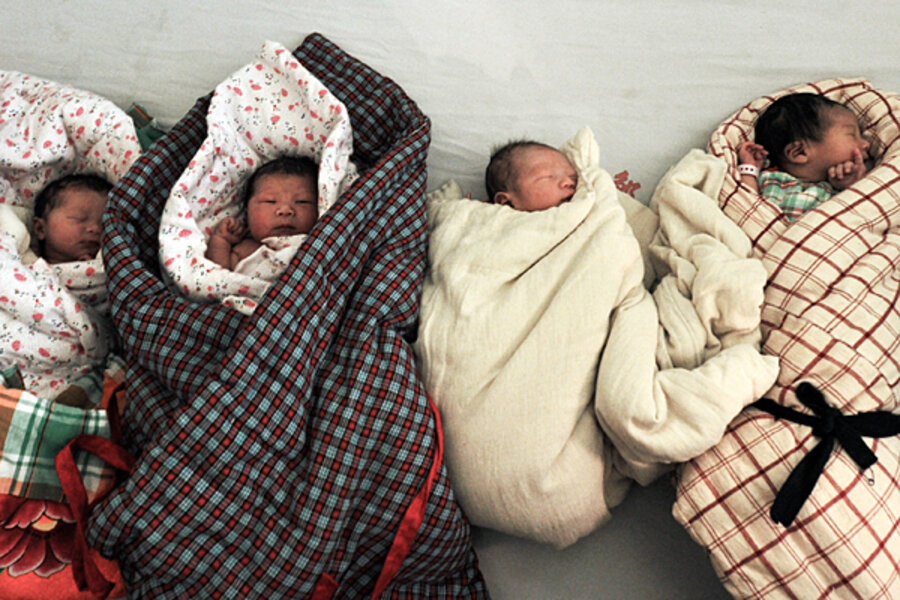Public anger spurs China to suspend 3 officials over forced abortion
Loading...
| Beijing
China suspended three officials and apologized to a woman who was forced to undergo an abortion seven months into her pregnancy in a case that sparked an uproar after graphic photos of the mother and her dead baby were circulated online.
The moves appeared to be aimed at allaying public anger over a case that has triggered renewed criticism of China's widely hated one-child limit. Designed to control the country's exploding population, the policy has led to often violently imposed forced abortions and sterilizations as local authorities try to meet birth quotas set by Beijing.
Feng Jianmei, 23, was beaten by officials and forced to abort the baby at seven months on June 2 because her family could not afford a 40,000 yuan ($6,300) fine for having a second child, Chinese media reported this week.
Photos of Feng lying on a hospital bed with the blood-covered baby, reportedly stillborn after a chemical injection killed it, were posted online and went viral, prompting a public outpouring of sympathy and outrage.
A commentary posted on the official website China.org.cn said the forced abortion "is society's shame." Another said the case exposed the lack of humanity in some administrative officials.
The government of Ankang city, where Feng lives in northwest China's Shaanxi province, said a deputy mayor visited Feng and her husband in the hospital, apologized to them and said officials would be suspended amid an investigation.
"Today, I am here on behalf of the municipal government to see you and express our sincere apology to you. I hope to get your understanding," Deputy Mayor Du Shouping said, according to a statement on the city government's website Friday.
Feng and her husband could not immediately be reached Friday. A relative who answered Feng's cellphone said the couple were in talks with city officials.
The official Xinhua News Agency said three officials would be relieved of their duties: two top local family planning officials and the head of the township government.
But one expert said the officials are unlikely to be seriously punished for a problem that has existed for three decades, and that is usually a result of orders carried out to meet the central government's population quotas.
"They're just pulling a trick to deal with the public. It's just a pretense," said Liang Zhongtang, a demography expert at the Shanghai Academy of Social Sciences. "I think this case will end up being ignored and forgotten like similar cases were in the past. Things have always been like this. Nobody will be fired."
China legalized abortion in the 1950s, but it didn't become common until the government began enforcing a one-child limit to stem population growth.
From fewer than 5 million abortions a year before 1979, the numbers jumped to 8.7 million in 1981, a year after the one-child policy was launched. It peaked in 1983 at 14.4 million before coming down as Chinarelaxed the policy to allow rural couples a second child if their first was a girl.
Xinhua said Feng was not legally entitled to a second child under China's one-child limit because she did not have a rural household registration, but added that late-term abortions are prohibited due to the risk of causing physical injury to the mother.
"The correct way to deal with the case would have been for local officials to allow her to deliver the baby first, and then mete out punishment according to regulations," the agency quoted an anonymous provincial family planning official as saying.
Abuses by family planning officials are often a target for popular frustration, especially amid a growing sense among better-off Chinese that the government has no right to dictate how many children people should have.
One reason that activist Chen Guangcheng enjoys a wider appeal within China than many other activists is that he and his wife documented complaints about forced abortions and sterilizations in the city that oversees his village. Among the cases were several women who said they were forced to have abortions within days of their due dates.
The couple's efforts angered local leaders. Chen was jailed and later placed under illegal house arrest, from which he fled six weeks ago in a daring escape. He is now living in New York with his wife and two young children.
The government says the one-child policy has prevented an additional 400 million births in the world's most populous country of 1.3 billion.
Critics of the controls point out that it leads to a dangerously imbalanced sex ratio. Families abort girls out of a traditional preference for male heirs.







